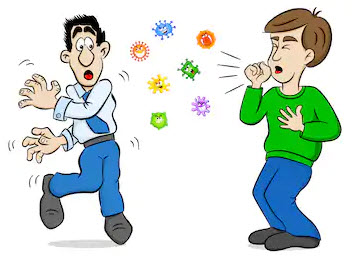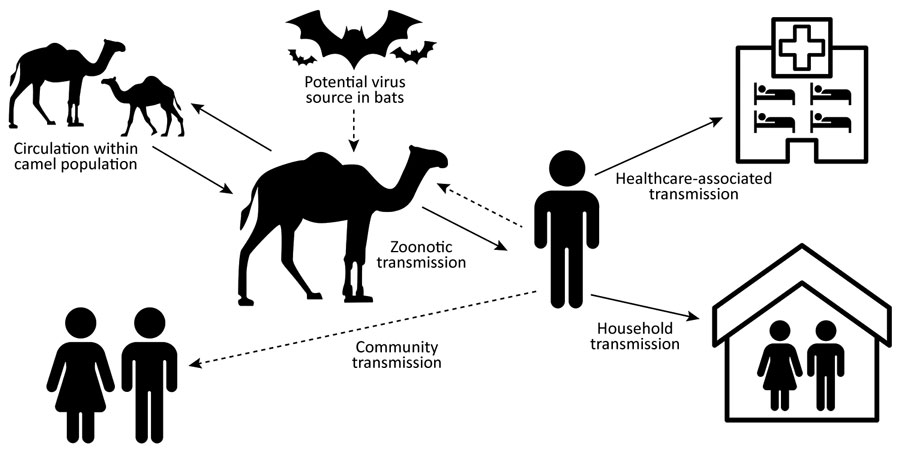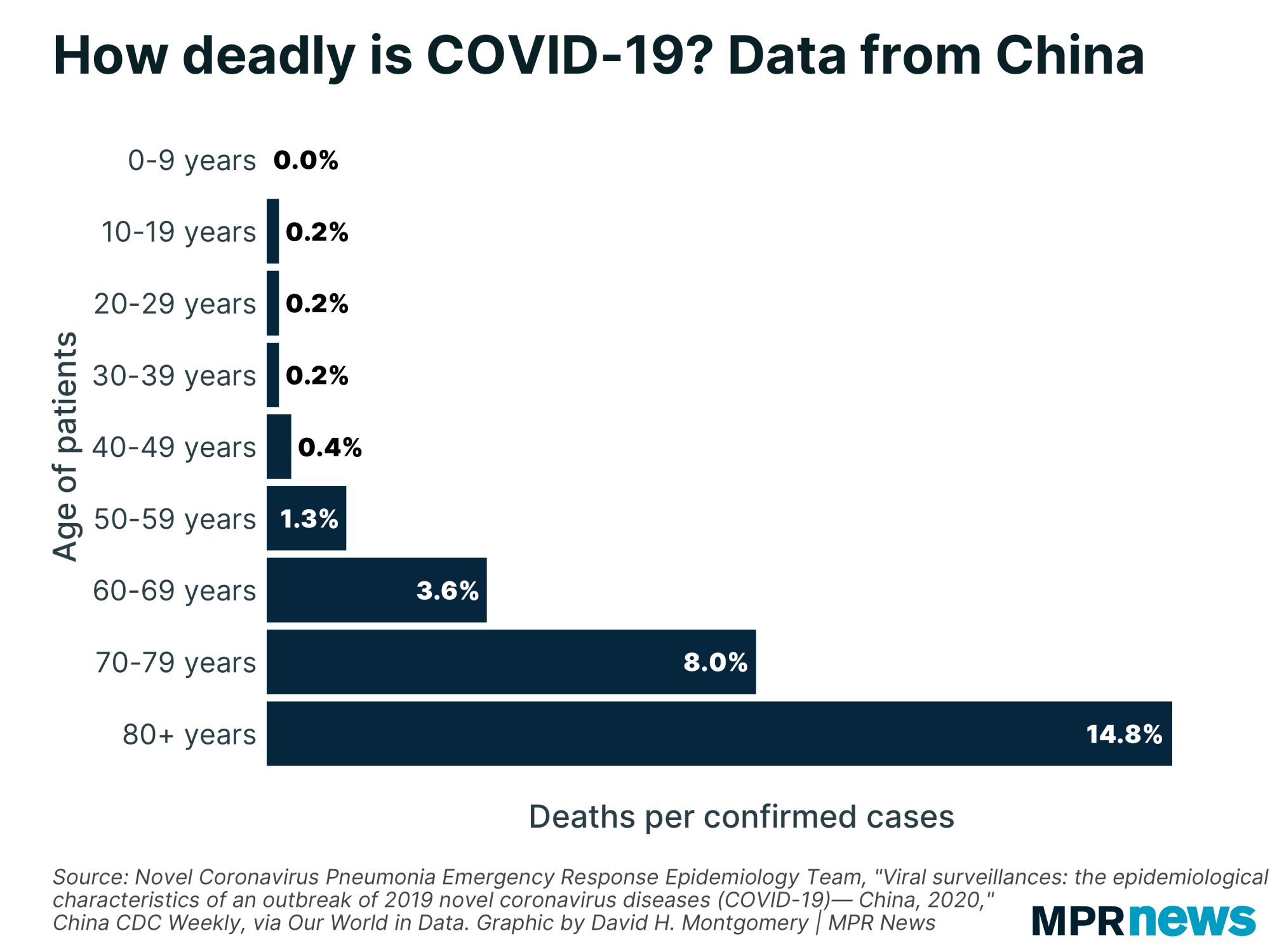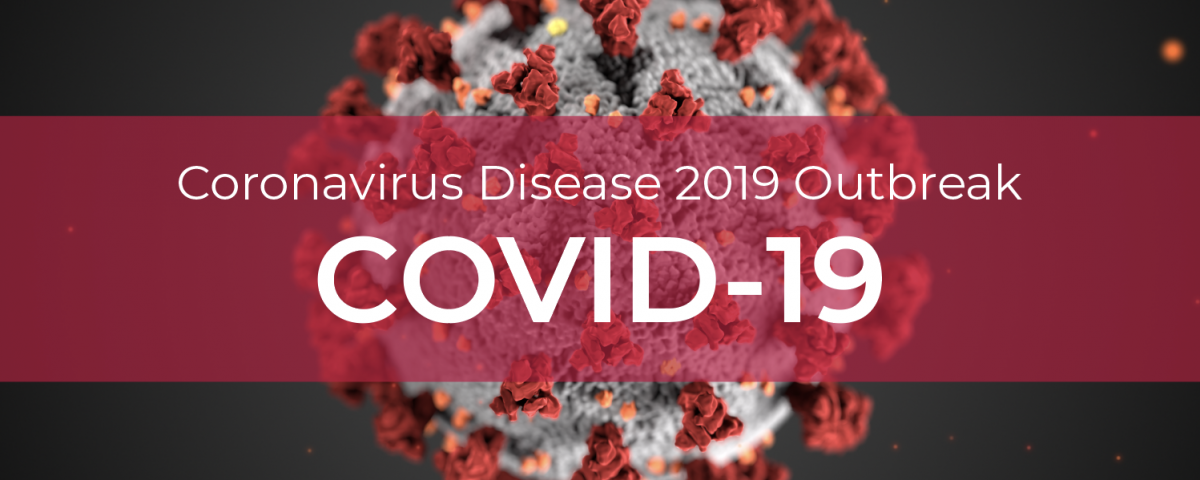This discussion covers the following information:
- Definition of Covid-19
- Causes of Covid-19 or SARS-CoV-2
- Types of Coronaviruses
- Transmission of Coronaviruses or Covid-19
- Mortality Rate of Covid-19 Considering Age Group
- Signs and Symptoms of Covid-19
- Precautionary measures and preventive steps to stay safe from Covid-19 and Coronaviruses
- Treatment and Management of Covid-19
- Do’s and Don’ts for Covid-19 infected patients
Covid-19

Covid-19 is the name given to the recent novel outbreak of coronavirus infection that started in Wuhan of China in the last of 2019. The earlier outbreak of coronavirus infection was in the year of 2002 in China. The present ongoing coronavirus outbreak has less mortality rate when compared to earlier outbreaks.
The earlier coronavirus outbreaks were termed as SARS and MERS-CoV, as they caused Severe Acute Respiratory Syndrome (SARS) and Middle-East Respiratory Syndrome (MERS) in the humans who got the infection. The reason for the higher mortality rate or we can say deaths is respiratory distress and low oxygen saturation which ultimately resulted in suffocation and death.
The mortality rate was extremely high in the MERS-CoV outbreak. The present coronavirus outbreak, known as SARS-CoV-2 infection, is less severe when compared to previous deathly SARS-CoV and MERS-CoV.
Causes of Covid-19
The only cause of Covid-19 is ‘Coronaviruses’. Coronaviruses are a large family of viruses that primarily attacks the respiratory system causing illnesses ranging from common flu-like symptoms such as the cold, runny nose, etc. to severe symptoms such as pneumonia, respiratory distress, kidney failure, etc.
Let’s learn about Coronaviruses
Coronavirus
Coronaviruses belong to a family of viruses known as “Coronaviridae”. Coronaviruses are named as such because of their appearance. In Latin words, Corona means “Crown”, these coronaviruses have a crown-like structure around its surface.

The crown is composed of a protein known as ‘Spike Protein’ that sticks out of the virus surface. There are different types of coronaviruses. Based on the severity of the damage they cause, they can be divided into less severe and more severe coronaviruses.
Less severe coronaviruses cause mild cold symptoms such as the runny nose, sore throat, etc., whereas more severe coronaviruses such as SARS and MERS causes pneumonia, kidney failure, and even death.
How Novel Coronaviruses or Covid-19 Spread?

There are 3 possible ways with which coronaviruses can spread from a person to person
- When an infected person coughs or sneezes on the face of a healthy person, that healthy individual gets infected. This transmission is occurring through respiratory droplets of the infected persons. Thus the droplets from an infected person are composed of viruses.
- When a healthy person shakes hand with an infected person. This mode of transmission is through physical touch. There is another possibility of transmission too when a healthy person touches a surface with viruses and then touches his or her own mouth, nose or eyes. Thus the healthy person gets infected.
- Another possible route of transmission is the fecal-oral mode. However, this transmission is rare and hadn’t been noticed yet. The point to be remembered here is, these coronaviruses get excreted in the stools of the infected persons and they remain alive in that for some time.
Types of Coronaviruses
Coronaviruses are considered zoonotic, as their transmission is between animals and humans. However, Chinese health organizations declared and confirmed the transmission of viruses from a person to person.
There are seven (7) types of coronaviruses that infect humans. Among them, 4 are more common, termed as Community-Acquired Coronaviruses, that infect people all over the world. The damage caused is potentially very low.
These four common coronaviruses strains are 229E, NL63, OC43, HKU1. They cause common cold-like symptoms.
There are 3 coronavirus strains that are worrisome, as they cause potential damage to humans through illnesses such as pneumonia, kidney failure, and death. They are
- Novel 2019 Coronavirus Strain (Covid-19 or SARS-CoV-2, originally called 2019-nCoV)
- SARS-CoV (Severe Acute Respiratory Syndrome Coronavirus Strain)
- MERS-CoV (Middle-East Respiratory Syndrome Coronavirus Strain)
A little information on SARS and MERS-CoV
The primary host for coronaviruses is considered to be bats. There is no evidence from where the present novel coronavirus strain started. However, the hypothesis is that again the bats are the leading original source.

SARS-CoV is thought to be evolved from infecting bats to civet cats and then to humans. The half bitten fruits dropped by horseshoe bats were ingested by civet cats with which the transmission starts.
MERS-CoV is thought to be evolved from infecting bats to camels and then to humans.
According to the CDC (Centre for Disease Control and Prevention), MERS-CoV usually causes fever, cough, and trouble breathing which often leads to pneumonia. 30 to 40% of people with MERS-CoV have died.
SARS-CoV usually causes fever, chills, body aches, and respiratory distress which could be fatal to health.
Mortality Rate of Covid-19
As per the data obtained from Chinese Health Organizations, the mortality rate or we can say the fatality rate of Covid-19 increases with the age of the patient.
The following graphs, obtained from different sources of the web, will explain the mortality rate of Covid-19

The following graph is old data from China when compared to the above graph.

From the above graphs, it is clear that the most affected age group people are elderly and the least affected age group is below 40 years of age.
What will be the reason for that? Why elderly people are affected more with Covid-19? Why Covid-19 is causing potential damage to senior people and leading to death?
These are the main questions which will be raising in everybody’s mind who read this post. I will try to explain this in a very simple sense,
As the age passes, the stamina or we can say the immune response of a person goes down. Generally, every living thing on this earth has a self-defense mechanism in-built which is known as ‘Immunity’ scientifically. The immunity becomes weak as the age passes by, and the person will become more prone to diseases due to poor immune function.
The poor immune system in elder people will allow the coronaviruses to multiply more rapidly and affect multi-organs inside their bodies. Thereby deaths are the ultimate results in the cases of elderly people.
Not only elders, those people whose immunity is compromised and those with cardiac and diabetic diseases are at higher risks of coronavirus infection.
Signs and Symptoms of Covid-19
No signs and symptoms will be observed in the patient soon after the infection. It usually takes 2 to 14 days for the symptoms to appear. In this meantime, the coronaviruses get multiplied into thousands and millions and damage the entire respiratory system particularly lungs.
The signs and symptoms that appear in the very beginning of Covid-19 infection are as follows:
- High fever (i.e., above 102F)
- Dry Cough
- Runny nose
- Sore throat
- Chills
- Body aches
- Malaise
Some severe symptoms of Covid-19 include
- Pneumonia
- Bronchitis
- Fibrosis of cells of lungs including alveoli
- Troubled breathing
- Low oxygen saturation and suffocation
- Kidney failure
- Multi-organ failure
- Death
It is impossible to distinguish coronavirus infection from other illnesses as the symptoms are similar in all the cases. Hence isolation should be done as early as possible and samples from the infected patients should be sent to laboratories for confirmation.
Coronaviruses attack the persons of almost all the ages, but those with good immunity and immunological responses will overcome them, and those with suppressed immunity will be majorly affected.
Fever is generally an immunological response shown by our body in response to the entry of foreign bodies i.e., viruses in this case.
How to know whether a person is infected by Coronaviruses or Covid-19?
As lab testing is not possible every time, there is one way with which you can come to know whether a person is infected with Covid-19 or not.
- Ask the patient whether he or she has traveled to any places recently where Covid-19 is prevalent.
- Ask the patient whether he or she has high body temperature i.e., fever within the last few days.
- Ask the patient whether he or she has a dry cough followed by a high fever.
That’s it if the answer is yes for all those three questions, then 95% chances are that the patient is infected with Covid-19 or Novel Coronaviruses.
Precautionary Measures and Preventive Steps
As we know that coronaviruses spread from a person to person through respiratory droplets of the infected persons, physical touch or shaking hands with the infected persons and through stools of the infected persons. However, fecal-oral transmission is very rare.
The precautionary measures and preventive steps that should be followed are as follows:
- Maintain a distance from the infected persons. At the least, a distance of 6 feet or 2 meters is considered.
- Don’t touch any objects or surroundings, around the infected persons, with your bare hands. Try to wear disposable hand gloves when you are going to deal with infected persons. As soon as you returned from them, dispose of the gloves and wash your hands thoroughly with soap or alcohol-containing hand sanitizers.
- Always wear face masks and gloves if you found any coronavirus suspects around you. Protecting eyes is also important, as the virus has the ability to pass through the membranes of eyes.
- Avoid the habit of touching your face, nose, and eyes more frequently until the coronavirus outbreak subsides. Never touch your own face, nose, eyes, and mouth after touching any surface or objects used by the infected persons.
- Always wash your hands thoroughly with soap or alcohol-containing hand sanitizers when you come home from outside. If possible wash your face too with soap, after washing your hands.
- If you found any suspects around you, call immediately the help-line numbers provided by the respective countries.
- Don’t follow home remedies even if you have common cold-like symptoms. Consulting a physician (doctor) or medical experts is the best option these days until this coronavirus outbreak completely ends.
- Eat fruits and vegetables as much as possible which are proven to boost immunity. If you don’t know about such fruits and vegetables, then google will help you in finding them out, use their search form.
- There are plenty of products available in the market such as Dabur Chyawanprash etc., that help in boosting your immunity. Consume them until the coronavirus outbreak subsides.
Treatment and Management of Covid-19
There is no specific medicine or vaccine available in the market till now for eradicating coronaviruses. Whatever the treatment following right now for Covid-19 disease is “Supportive”.
What does Supportive treatment mean?
Supportive treatment means treating the symptoms exhibited by the patient infected with Covid-19 or Novel Coronaviruses (2019-nCoV). In a simple sense, supportive treatment doesn’t treat the disease itself, but instead, it treats the symptoms of the disease so that the disease will perish by itself.
For example, if the patient with Covid-19 shows
- High fever – Acetaminophen (also known as Paracetamol) is given to reduce the body temperature of the patient.
- Runny nose – Anti-allergic like levocetirizine, cetirizine, chlorpheniramine are given to reduce the symptom.
- Body aches including headache – Acetaminophen plays the role here too. It has both analgesic and antipyretic properties.
- Troubled breathing – Inhalational steroids such as fluticasone will be given to improve the breathing process.
- Low oxygen saturation and suffocation – intensive ventilatory support is provided where pure oxygen is provided to the patient.
No antibiotics play a role in the treatment of Covid-19 as coronavirus is a virus. However, if co-infections exist along with 2019-nCoV then antibiotics might be used in the hospitals for the treatment.
In this way, treatment is carried out in hospitals. However, preventive and precautionary measures are strictly followed there to prevent the spread of the disease in the surroundings.
Do’s and Don’ts for Covid-19 Infected Patients
There are few things which should be followed by Coronavirus infected patients. They should keep these points in their minds.
- Don’t panic if you get any symptoms or if your laboratory test results for Covid-19 found positive.
- Don’t stay in the crowd or among family members, isolate yourself from them to prevent the spread of disease.
- Don’t sneeze or cough over others’ faces or in the surroundings. The coronaviruses remain alive on the surfaces for a sufficient time.
- Always wear masks over your faces. This prevents the expulsion of respiratory droplets during sneezing and coughing.
- Don’t touch your own nasal, lacrimal and oral discharges as it thought to be useful in the prevention of the spread of SARS-CoV-2 infection.
- Always wash your hands and face, and disinfect your surroundings.
Do’s
- Consume all those products which help in boosting your immunity. There are readily available packages of immune boosters, purchase them and consume.
- Cover your mouth with hands or make use of elbow during sneezing and coughing.
- Stay away from your family, consult a medical physician and admit in a hospital as soon as you experience any symptoms of Covid-19.
- Call helpline numbers to know more about coronaviruses and follow the measures advised by them.
Advice from Getcured Apothecary Team
For normal healthy individuals –
- Don’t be afraid of Covid-19 Coronaviruses. Everything depends on your inner health conditions. Stronger the immunity your own body can kick it off and you will recover soon.
- Follow the precautionary measures and preventive steps very strictly.
- Stay safe and stay healthy. Save the helpline numbers provided by the respective governments or else remember them for emergency situations.
For Coronavirus infected patients –
- Don’t be panic about Covid-19 Coronaviruses and Don’t lose hope. Fear is the worst thing which makes the situation worse. We would like to say one thing, Covid-19 can be cured by itself depending on immunity if the symptoms are treated well. There are cases where anxiety and fear make health worse than the disease that ultimately leads to death. So stay cool, lets the doctor do their part of the treatment, you will recover soon. Don’t lose hopes on life.
- Isolate yourself from over-crowding and from your family members as soon as you find out any symptoms of coronavirus infection in you. Call the helpline numbers as soon as possible.
- Don’t spit or sneeze or cough openly in the environment as it may affect other’s life too. Doing so may risk other’s life. Always wear masks on your faces so that the harmful viruses and bacteria get filtered out and remain there itself.
- Don’t be afraid, stay cool, everything will be alright and you will recover soon. You must have belief in Almighty that God never harms you.



